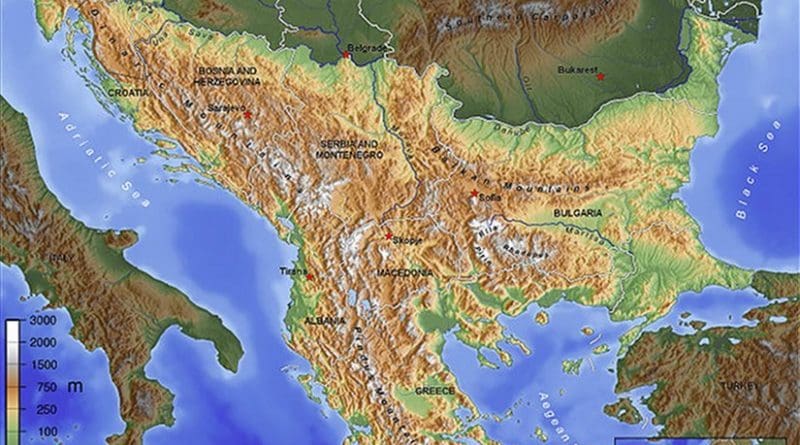Neglected Backwater: Russia’s Growing Influence In The Balkans – OpEd
By William McHenry
Russian election meddling in the United States and Europe has captured headlines across both continents. As policymakers on both sides of the Atlantic develop their own responses, they have overlooked a key geopolitical theater, the Balkans. As part of Russia’s continuous efforts to undermine NATO and the EU, it has committed considerable resources toward gaining influence in the region. Not only has Moscow sought to halt the expansion of NATO and the EU, but it has also attempted to solidify its influence in the region by supporting pro-Russian political parties and leaders. To date, Moscow’s regional influence campaign has been as bold as it has been effective. Accordingly, policymakers on both sides of the Atlantic need to confront Russia’s meddling in the region and act in this neglected theater.
Since 9/11, both the United States and Western Europe, which played key roles intervening in the Yugoslav civil wars of the 1990s, have been understandably distracted by violent extremism in the Middle East and Central Asia. This has shifted attention and resources away from resolving the many protracted ethnic, religious, and political conflicts which plague the southeastern periphery of Europe. This strategic inattention has allowed Moscow to be remarkably successful in its efforts to stall European integration through a mixture of tradecraft, economic coercion, disinformation campaigns, arms sales, and high-level political posturing.
An extensive report written by leading Russian foreign policy expert Mark Galeotti outlines how Russia has targeted Southeastern Europe to exacerbate existing tensions and gain bargaining chips vis-à-vis the EU and NATO. He argues that Putin’s re-election coupled with the leadership dynamics of Russia’s national security establishment are pushing Russia’s aggressive foreign policy towards the Balkans. Most importantly, “in Russian eyes, the EU’s approach towards the Western Balkans (Albania, Bosnia and Herzegovina, Kosovo Macedonia, Montenegro, and Serbia) is neither serious nor systematic and so offers Moscow opportunities to create leverage.”
With the exception of Montenegro’s 2017 accession to NATO, the prospect of further political integration with NATO and the EU is bleak. In Serbia, Kosovo’s independence remains unresolved, and Macedonia remains locked in a bitter political dispute with Greece. Additionally, Bosnia and Herzegovina is still governed by deadlock—a product of the still unreformed constitution from the Dayton Peace Accords. In all these cases, endemic political instability has been the greatest factor that has prevented meaningful progress on the institutional reforms necessary for these countries to join NATO and/or the EU. These issues, though not caused by Russia, have weakened these countries’ institutions to the extent that they are more susceptible to the Kremlin’s influence.
The Guardian reports that there has been a Russian led disinformation campaign in Macedonia since at least 2008. The article references documents captured by Macedonian intelligence that outline Russia’s goals and strategy. More specifically, Russia exploited Macedonia’s ethnic divisions in its media with the goal of preventing NATO and EU expansion and reducing the political influence of these institutions.
Although Serbia cooperates with NATO on humanitarian issues, it has recently agreed to a landmark arms deal with Russia. Today these bilateral security ties have been augmented by the revival of pan-Slavism in the region fostered by Russia. In fact, a majority of the Serbian public supports military cooperation with Russia. As a result, the Serbian political climate has become less friendly towards the prospect of integration with the EU.
Russia has also increased non-kinetic attacks on Montenegro since its NATO accession by exerting economic pressure and exploiting political tensions. More importantly, it likely supported an unsuccessful coup attempt against the Montenegrin government to prevent NATO accession, as Moscow had invested considerable resources in the country with the hopes of gaining a naval base in the region.
There is little doubt that the EU and the United States have lost credibility in the region as partners. Much of this is due to internal crises such as Brexit and the spread of anti-institutionalist populism, but Washington and Brussels also deserve blame for neglecting a region they initially committed so much to after the end of the Cold War. Nonetheless, there are signs of hope as Macedonia and Greece may resolve their political dispute, removing one of the significant roadblocks to European integration in the region, and policymakers in Washington and Brussels are finally coming to terms with Russia’s growing influence. However, it is important to note that Washington/Brussels and Moscow are not competing in a geopolitical vacuum in the Balkans. Both Turkey and Saudi Arabia have made significant soft power investments in the region to increase their influence as well.
In the Balkans, the Kremlin’s use of political subversion furthers its primary foreign policy goal of preventing the expansion of NATO and the EU into its perceived sphere of influence. Though these activities by Russia in the Balkans have been overshadowed by the Syrian civil war, President Trump, the EU, and NATO would be wise to turn their attention back to the region.
The opinions, beliefs, and viewpoints expressed by the authors are theirs alone and don’t reflect any official position of Geopoliticalmonitor.com.

